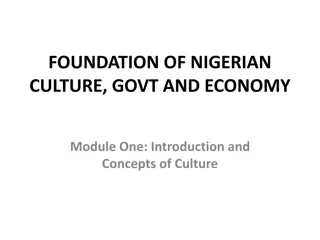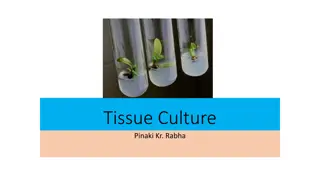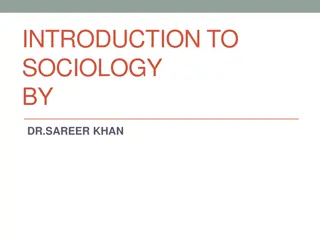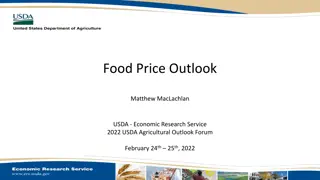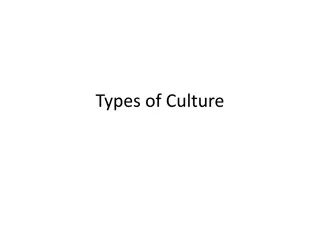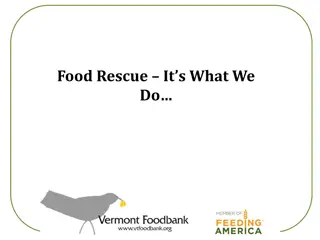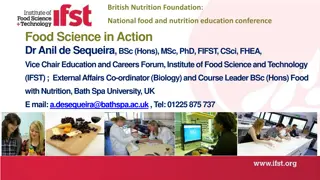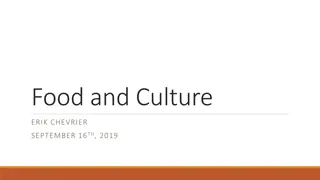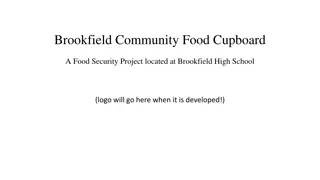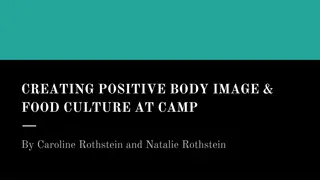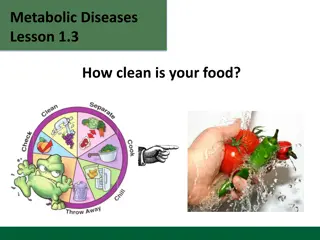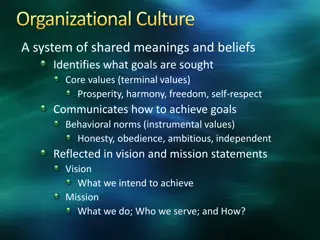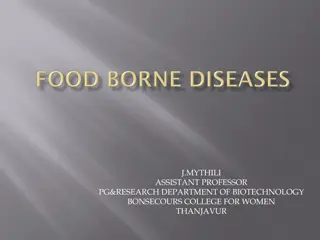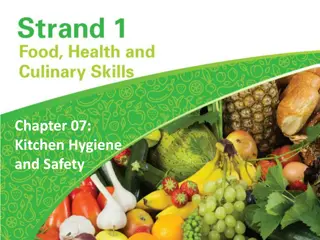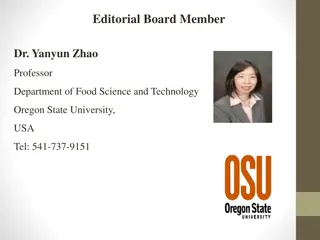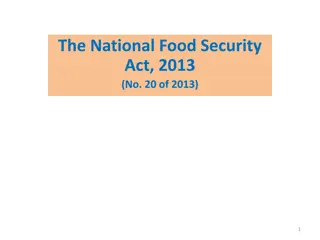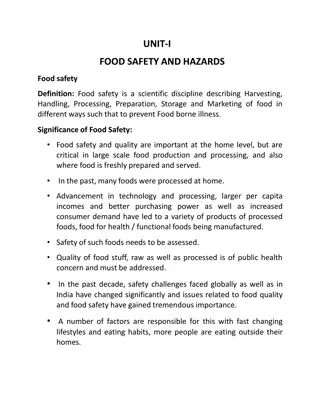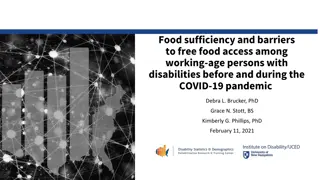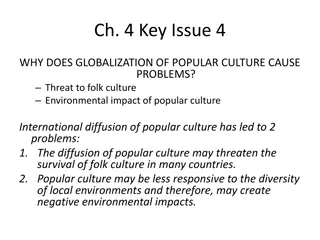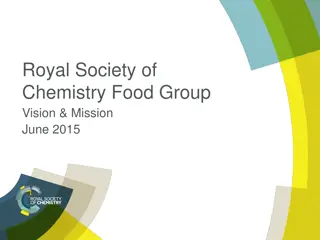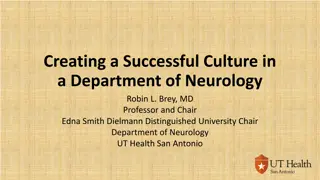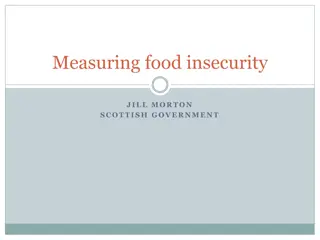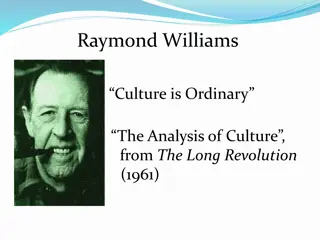Transforming School Food Education for Health and Wellbeing
The Food Education Roadmap aims to prioritize health and wellbeing through food for students, promoting a culture of healthy eating, wellness, and lifelong habits. It emphasizes access to healthy food, nutrition education, experiential learning, and community involvement. The initiative requires col
3 views • 12 slides
The Slow Food Movement: A Revolution in Food Culture
The Slow Food Movement, initiated by Carlo Petrini in 1986, challenges the fast food industry and advocates for mindful consumption. Petrini's vision promotes awareness of food sourcing, support for sustainable practices, fair compensation for producers, and the enjoyment of nutritious, flavorsome f
1 views • 17 slides
Role of Microorganisms in Food and Industry
Microorganisms play a crucial role in the food and industrial sectors, both benefiting and causing harm. They are involved in processes such as organic compound transformation, fermentation, and food production. While beneficial microorganisms contribute to the creation of various useful food produc
5 views • 44 slides
How are plant essential oils valuable as functional ingredients
Food Research Lab is one of the leading food industry consultants and offers various food production services. We provide food production and food manufacturing consultancy services to food, beverage and nutraceutical companies. Primary food production involves everything from food procurement, inve
9 views • 12 slides
Nigerian Culture, Government, and Economy: Module One
Delve into Module One of the course on Nigerian culture, government, and economy with a focus on the Introduction and Concepts of Culture. Explore definitions of culture, various types of culture, characteristics, importance, related concepts, levels, and differences between culture and ethnic group
1 views • 31 slides
Plant Tissue Culture: Methods and Requirements
Plant tissue culture involves the in-vitro culture of plant explants under aseptic conditions, covering cell, organ, and suspension cultures. This process, pioneered by German botanist Gottlieb Haberlandt, relies on the totipotency of plant cells. Key requirements include laboratory organization, su
1 views • 18 slides
Culture in Sociology: Key Concepts and Definitions
Culture is the cornerstone of society, distinguishing humans from animals and shaping our social lives. Sociologists define culture as the shared values, practices, norms, and beliefs that govern our interactions and behaviors. This comprehensive guide explores the non-material aspects of culture, i
2 views • 30 slides
Overview of Cell Culture Methods and Importance in Research
Introduction to the principles of cell culture, including tissue culture, organ culture, and cell culture methods. Discusses the advantages and disadvantages of each technique and highlights the need for cell culture in research for studying cellular behavior and large-scale production of cell mater
4 views • 45 slides
Overview of Food Price Trends and Consumer Expenditures in the US
The presentation highlights the consumer spending on food, food price trends over time, 2021 food prices, and forecasts for 2022 in a historical context. It emphasizes that U.S. consumers spent 12% of their expenditures on food in 2020, aligning with historical averages. Food price inflation remaine
1 views • 21 slides
Popular Culture: Classification and Impact
General classification of culture includes Popular, High/Elite, Low/Subculture, Primary & Secondary, Folk, and Co-Culture. Popular culture, shaped by mass media, encompasses ideas, attitudes, and phenomena favored by society. It influences daily life, with examples like styles of dress, slang, and s
1 views • 16 slides
Food Rescue: Vermont's Hunger Relief Efforts and Food Safety Initiatives
Vermont Foodbank, founded in 1986, is the state's largest hunger relief organization, serving over 153,000 people annually with a focus on fresh produce and community partnerships. They face challenges like lack of refrigerated storage and fundraising constraints but maintain a strong food safety cu
0 views • 6 slides
Food Equipment Usage Guidelines for Safe Food Handling
Enhance your knowledge on using equipment for making food with proper safety procedures. Learn about essential points like wearing protective gear, checking hot food temperatures, food safety principles, and sanitization requirements. Understand machine settings, food temperature checks, and serving
2 views • 22 slides
National Food Reserve Agency (NFRA): Enhancing Food Security in Nigeria
The National Food Reserve Agency (NFRA) under the Federal Ministry of Agriculture & Water Resources plays a crucial role in addressing agricultural production, storage, and marketing challenges in Nigeria. With a vision to ensure sustainable food access for all Nigerians and become a global food pro
2 views • 30 slides
Best Practices for Food Preparation to Ensure Food Safety
This chapter highlights essential practices for prepping food to prevent cross-contamination and time-temperature abuse in a food service setting. Topics covered include safe methods for thawing food, cooking temperatures, microwave cooking, informing consumers of risks, requirements for partially c
3 views • 25 slides
Food Science and Technology in Modern Society
Delve into the world of food science and technology with insights on what scientists do, the importance of understanding food, definitions of food science and food technology, factors affecting food spoilage, and traditional and modern food processing technologies. Gain knowledge on testing hypothes
2 views • 22 slides
Proposed NRC Safety Culture Policy Statement Overview
This document provides an overview of the proposed Nuclear Regulatory Commission (NRC) Safety Culture Policy Statement presented by Eric Fries, the Safety Culture Program Manager. It covers topics such as NRC's mission, responsibility, safety culture background, draft policy statement, current statu
0 views • 24 slides
Food Safety Practices in Service Industry
This chapter focuses on the essential food safety practices in the service industry, covering topics such as time and temperature requirements for holding food, ways to prevent time-temperature abuse and cross-contamination, minimizing bare-hand contact with food, preventing staff and customers from
1 views • 26 slides
Exploring the Relationship Between Food and Culture
Food culture encompasses practices, attitudes, and beliefs surrounding food production, distribution, and consumption, reflecting a group's identity, values, and creativity. Cultural norms influence how individuals interpret food, highlighting the dynamic interaction between food and society in shap
0 views • 18 slides
Brookfield Community Food Cupboard: Addressing Food Insecurity at Brookfield High School
Brookfield Community Food Cupboard is a project aiming to provide food security to individuals and families in the Riverside Park/Hunt Club area, including students and families served by Brookfield High School. The initiative seeks to supplement existing food security programs by offering a day's w
0 views • 11 slides
Positive Body Image and Food Culture at Camp
Explore themes surrounding body image and food culture at camp, understanding how these impact campers and staff. Learn to make positive shifts in camp culture, addressing disordered eating and emotional eating. Discover the intersection of food and body image, challenges faced, promoting body posit
1 views • 15 slides
Plant Tissue Culture Methods for Growth and Reproduction Study
Plant tissue culture methods such as root tip culture, shoot-tip culture, leaf culture, flower culture, and anther and pollen culture allow for the study of growth, reproduction, and genetic variations in plants. These techniques involve culturing various plant parts under sterile conditions to inve
2 views • 20 slides
Food Safety and Preventing Food-borne Illness
This lesson focuses on the importance of food safety, addressing how clean our food is and at what points safety can be compromised. It delves into common types of microbes that contaminate foods and explores ways in which food safety can be compromised. The activity involves case studies on food sa
0 views • 11 slides
Mastering Good Food Hygiene and Storage Practices
Understanding food spoilage causes, common food-poisoning bacteria, conditions for bacterial growth, ways to prevent food contamination, safe food handling practices, HACCP concept, types of perishable foods, importance of proper food storage, packaging materials for food, and recognizing signs of f
2 views • 27 slides
Organizational Culture and Its Impact on Business Success
Organizational culture encompasses shared beliefs, values, and behaviors within a company. It influences goal-setting, strategies, and employee actions. The transmission of culture is vital for aligning values with business practices. Culture matters for client relations, differentiation, and managi
1 views • 17 slides
Food-Borne Diseases: Causes, Symptoms, and Prevention
Food-borne diseases are caused by the ingestion of contaminated food containing microorganisms or chemicals. There are two types of food infections - contaminated food acting as a carrier of microorganisms and food serving as a culture medium for pathogens. Bacteria, viruses, and parasites are commo
0 views • 20 slides
Kitchen Hygiene and Food Safety
Kitchen hygiene and food safety are crucial to prevent food spoilage and food poisoning. Factors like enzymes, micro-organisms, and oxygen can lead to food spoilage, while food poisoning occurs when pathogenic bacteria multiply in consumed food. Practicing proper hygiene, storage, and preparation me
0 views • 27 slides
Dr. Yanyun Zhao - Food Science & Technology Professor at Oregon State University
Dr. Yanyun Zhao is a prominent Professor at Oregon State University specializing in food science and technology. With a strong research focus on food processing technologies and food safety, Dr. Zhao has made significant contributions to the field. Her expertise in value-added food processing, antim
1 views • 16 slides
National Food Security Act, 2013 Overview
The National Food Security Act, 2013 (NFSA) aims to ensure food and nutritional security for all by providing access to adequate quality food at affordable prices. It includes provisions for hot cooked meals, food security allowance, social audit, nutritional support for children, and various monito
1 views • 15 slides
Importance of Food Safety in Modern Food Production
Food safety is crucial in modern food production to prevent foodborne illnesses. With advancements in technology and increased demand for processed foods, the need to ensure the safety and quality of food has become paramount. Factors affecting food safety include poor hygiene practices, contaminate
1 views • 30 slides
Food Justice and Insecurity: A Comprehensive Overview
Food Justice Primer provides insightful definitions and discussions on key concepts such as food justice, food insecurity, food sovereignty, and food deserts. It highlights the need for equitable sharing of benefits and risks in the food system, aiming to transform current disparities and inequities
1 views • 49 slides
Food Sufficiency and Barriers to Free Food Access Among Working-Age Persons with Disabilities Before and During COVID-19 Pandemic
Working-age persons with disabilities face economic vulnerability and higher chances of living in food-insecure households. This study explores food sufficiency and barriers to accessing free food during the COVID-19 pandemic. Data was collected through an online survey, revealing insights into food
2 views • 14 slides
Challenges of Globalization in Popular Culture
Globalization of popular culture presents challenges such as the threat to folk culture and negative environmental impacts. Rising incomes lead to a shift from folk to popular culture, affecting traditional values and clothing symbolism. The adoption of Western clothing in Middle Eastern countries f
0 views • 12 slides
Royal Society of Chemistry Food Group Vision & Mission Summary
The Royal Society of Chemistry Food Group aims to lead, promote, and disseminate the understanding and importance of chemistry in food. Their vision is to enhance food and nutrition security through advancing the chemistry of food ingredients. They strive to engage with various communities to promot
2 views • 4 slides
Cultivating a Successful Culture in Neurology Department
Importance of culture in a neurology department highlighted by Dr. Robin L. Brey. Emphasis on how culture trumps strategy and the role of leaders in maintaining a positive culture. Examples and insights on how culture influences decision-making and behavior. Attributes of a successful culture and ho
0 views • 21 slides
Food Insecurity Measurement in Scotland
The report emphasizes the importance of understanding and addressing food insecurity effectively in Scotland. It discusses the dignity in ending hunger, the rights to nutritious food, and the limitations of emergency food aid. The Food Insecurity Experience Scale is highlighted as a tool for measuri
0 views • 7 slides
Food Costing and Pricing in the Food Industry
Explore the factors influencing food costs in the restaurant industry, including the importance of food cost percentage, pricing strategies, and impact of location on food prices. Learn about managing food costs, controlling waste, and optimizing profitability through effective cost analysis and men
1 views • 12 slides
Efficiency and Quality in Computational Food Systems
Addressing challenges in the food industry with a focus on safety, waste reduction, and improving quality. The project aims to utilize computational methods to enhance food provenance, efficiency, and effectiveness, ultimately leading to a more sustainable and secure food system. Key motivations inc
0 views • 25 slides
Household Food Insecurity in Canada and the UK: A Study
This study explores household food insecurity and food bank usage in Canada and the UK, shedding light on the initiation of food banks, trends in food bank use, and the demographics of individuals relying on food banks. It delves into the construct of food insecurity, potential manifestations, and t
0 views • 45 slides
Raymond Williams
Raymond Williams delves into the complexities of culture in his influential works such as "Culture is Ordinary" and "The Long Revolution." He explores the multifaceted meanings and references of culture, categorizing it into ideal culture, documentary culture, and social culture. Williams, along wit
0 views • 14 slides
Raymond Williams on Culture: Analysis and Definition
In his works like "Culture is Ordinary" and "The Long Revolution", Raymond Williams delves into the complexity and evolution of culture. He discusses three categories of culture: ideal culture, documentary culture, and social culture. Williams emphasizes the nuanced meanings and references of the te
0 views • 13 slides




